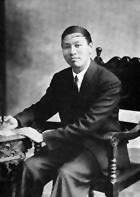
Watchman Nee
“I want nothing for myself; I want everything for the Lord.” These words of Watchman Nee can be regarded as the motto of his life and ministry. The Local Church movement which he founded also spread overseas, especially after the establishment of the Communist regime in 1949. Through his itinerant preaching and voluminous literature work, Nee greatly influenced the conservative wing of the Chinese church. The theological vocabulary he formulated has become an important ingredient in today’s Chinese theology. For almost 20 years, he was imprisoned by the Chinese government, but he kept his faith until his death.[1]
A biographer Watchman tells of a time in Nee’s life that doctors advised a time of rest for him in the healthier climate of in China’s Kuling Mountain. They believed it would improve Watchman’s lung condition. In 1929 he spent many weeks there to recuperate, meditating on God’s Word and his perspective on the Christian life. This provides a backdrop for a glimpse into one of his spiritual discoveries.
“‘When I first came to the Lord’, he says, ‘I had my own conception of what a Christian was, and I tried my utmost to be that kind of Christian. I thought a true Christian should smile from morning to night. If at any time he shed a tear he had ceased to be victorious. I thought, too, that a Christian must be unfailingly courageous. If under any circumstances he showed the slightest sign of fear he had fallen short of my standard.’
“But his serial reading of the New Testament had brought him back and back again to Paul’s autobiographical letter, 2 Corinthians, where he read ‘ as sorrowful…’ and the words arrested him. A great Christian who shed ‘many tears’, who could be ‘perplexed’, and who could even ‘despair of life itself’ must be very human. Is it possible, he asked, that Paul despaired ? This was just where he himself had been! ‘I discovered,’ he says, ‘that Paul was a man, and the very sort of man I knew.’
“There began to dawn on him the secret of Christianity that is summarized in the words: “We have this treasure in earthen vessels, to show that the transcendent power belongs to God and not to us.’ Now as he learned to trust God hourly for his very life, he came to a new place of rest in Him.”[2]
The previous year Nee had written his lengthy and profound book on The Spiritual Man. This shows that illumination in applying the deeper truths of the cross is an ongoing process. He had been blessed by the writings of T. Austin-Sparks and Jessie Penn-Lewis in the previous months before his recuperation at Kuling Mountain. His continuous reading of God’s Word was vital to his spiritual growth and biblical insight.
This meditation on the deeper life did not distract Watchman from a heart for evangelism. The couple who provided his daily lunch at Kuling opened their hearts to the gospel. Thereafter, he would read the Scriptures with them and provide food for their hungry hearts.
Father, help us to continuously read Your Word with a receptive, hungry heart. Grant us greater illumination to appreciate that You are the source of our sufficiency. We rest in You. In Christ’s name, amen.
[1] Biographical Dictionary of Chinese Christianity: http://www.bdcconline.net/en/stories/n/ni-tuosheng.php
[2] Against the Tide, by Angus Kinnear (Victory Press) p. 107.
Scriptures cited: 2 Cor 6:4-10, 1:8-11, 4:7-10 c.f. 3:4-6

















